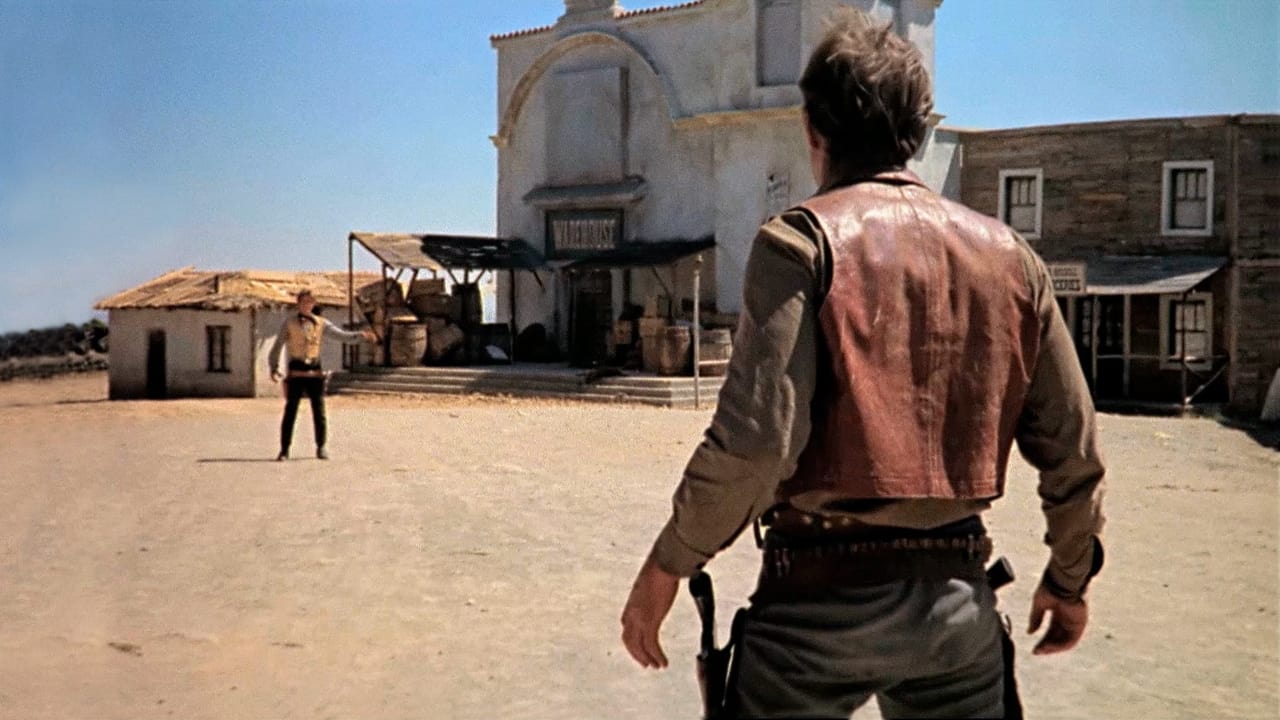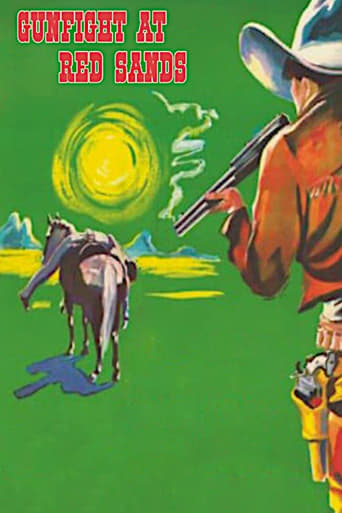

You won't be disappointed!
... View MorePeople are voting emotionally.
... View MoreThis is a must-see and one of the best documentaries - and films - of this year.
... View MoreThis is ultimately a movie about the very bad things that can happen when we don't address our unease, when we just try to brush it off, whether that's to fit in or to preserve our self-image.
... View More"Gunfight at Red Sands" has one of the cooler sounding Western movie titles of the modern era. The title would have been right at home as an episode of 'The Dakotas' which came out the same year, 1963. Though it appears to hold an important place in the early history of Spaghetti Westerns, the film for me was a rather run of the mill affair with it's Euro-West flavor and unrelenting revenge theme. The opening scene in which the Gringo's (Richard Harrison) partner Francisco was shot in the chest by a posse shooting from behind as they gave chase may have colored my perception about what was to follow. That sort of stuff should have gone out with Fifties B Westerns.That's not to say that the picture didn't offer some interesting elements. The Martinez sister Lisa (Sara Lezana) takes an active role in the action showing some skillful firearm work in the final showdown against Sheriff Corbett's (G.R. Stuart) bunch. Just before that, I thought it was cruelly ironic that the Sheriff gunned down his own girlfriend Maria (Mikaela) during the posse chase, a classic case of what goes around comes around. Ultimately though, this one didn't strike me as anything special. At one point in the story, the Gringo is asked how he's doing and he replies - "Things are bad but they'll get better". I guess it's all a matter of perspective. Still, it was a cool title.
... View MoreMuscle-bound peplum star Richard Harrison dons a Stetson and buckles on spurs and six-shooters in Spanish director Ricardo Blasco's "Gunfight at Red Sands," one of the earliest examples of Continental westerns before Sergio Leone's "A Fistful of Dollars" kick-started Spaghetti westerns. Some of the people behind the scenes on this oater later on figured prominently in the Leone westerns, principally composer Ennio Morricone using the pseudonym 'Dan Savio,' "Fistful of Dollars" lenser Massimo Dallamano as 'Jack Dalmas,' veteran Euro-western bad guy Aldo Sambrell of "Navajo Joe," and another "Fistful of Dollars" actor Jose Calvo who owned the saloon between the Rojos and the Baxters in the Leone classic. Morricone cut his teeth on Euro-westerns with this Spanish-produced sagebrusher and the title tune that he composed with lyricist Dicky Jones could easily qualify as the anthem for spaghetti westerns, with lyrics like "Keep your hand on your gun/Don't you trust anyone/There's only one man you can trust/That's a dead man or a Gringo like me." Altogether, "Gunfight at Red Sands" ranks as a pretty fair facsimile of the American variety with heaps of hard-riding, fast-shooting action set against rugged desert scenery and a well-laid out western town.Richard Harrison, who made several spaghetti westerns, such as "Gunfight at High Noon" (1963), "One Hundred Thousand Dollars for Ringo" (1965), "El Rojo" (1967), and "Between God, the Devil, and a Winchester" (1968), was just at home on the range as a western hero as he was in the peplum genre as a strongman. The character that he plays in "Gunfight at Red Sands" is the 'Gringo' referred to in Ennio Morricone's song. Before Gringo makes his appearance, scenarist Albert Bandwho helmed a couple of spaghettis himself, "The Tramplers" (1966) and "The Hellbenders" (1967)and writer/director Blasco lay the ground work for the action. Manuel (Giacomo Rossi-Stuart) rides into Red Sands to drink and gamble, but he drinks too much and loses everything, including a pouch of gold. During his gambling spree, he mentions that his father, sister, and he have found more than enough gold to buy the saloon. Later, three masked gunslingers surprise his dad at home, shoot him in cold blood, and steal several bags of gold from a compartment in the floor. Meantime, Ricardo (Richard Harrison) has spent the last four years fighting alongside the revolutionaries in their desperate bid to rid their country of the oppressive political regime that makes their lives so miserable. White-clad soldiers by the dozens have Pedro (Jose Calvo) and Gringo on the run. In fact, Gringo barely escapes with his life after Pedro and they splash across the Rio Grande back into Texas, but one of the troops fires a last shot and kills poor Pedro. Sickened by all this bloodshed, Gringo decides to settle down and live a peaceable life. His illusions are shattered when he rides home to find his father dead on the floor of their ranch. When Gringo launches his own investigation, he clashes with the local lawman who displays his bigotry for all things Hispanic as do several of the townspeople. Later, inquisitive Manuel discovers that Maria, a saloon hostess, has been keeping their stolen gold stashed in their safe. Manuel kills the saloon owner, escapes with the gold and a posse pursues him to the ranch. Gringo sends Manuel packing before the posse arrives. When they show up, Gringo proves that the stolen gold belonged to his father. An anti-Mexican deputy gets in a brawl with Gringo and our hero kills him in front of witnesses, providing the sheriff with a legitimate reason to lock him up."Gunfight at Red Sands" has several surprises and plot twists during its lean 95 minute running time. The intolerance shown toward Mexicans qualifies it as a message movie of sorts and the hero is an American who had been adopted by Mexicans and raised as one of the family. No, there are no racial epithets, but one laughing cowboy distinguishes Mexicans by their stench until Gringo roughs him up during a saloon brawl. Morricone's flavorful scores enhances the excitement and heightens the drama throughout. The dubbing appears to be rather well-done, considering that this is a Euro-western, and the performances throughout are good, too. Unfortunately, the only prints available of this landmark western are horrible public domain prints, but it is still an entertaining saga.
... View MoreThis is a film for people with interest in the Western genre, mostly those who respect the European sub-genre, in the 1990's mostly connected to Italy, Sergio Leone and Clint Eastwood but nowadays also related to director-names such as Sergio Corbucci and Sergio Sollima.Filmed before Sergio Leone's success of the dollar-films, Duello nel Texas has several motives in common with Leone's films. The film is said to be set in the same surroundings, the film has the same composer (Morricone of course) and the film's story is set near the border between USA and Mexico. I watched it as a small kid, with enthusiasm over the action packed plot and some colorful characters. 20 years later, I got the opportunity to see it again. No widescreen, bad colors, bad sound and a very scratchy picture. At least it was the film that I had been waiting for.Duello nel Texas doesn't start very promising but it grows. The Morricone-music is the best of it. The main antagonists holds the film together, and everything results in a conventional but great gunfight (that kind of direction looks so European/Italian-Western). You can find rather independent woman in the film, some anti-racism and a typical fist-fight (set in a bar). The plot is not as sophisticated as the ones in Leone's films, but it works good on it's own.Duello nel Texas is a must see for the "die-hard European Western- fan".Rating: 6 of 10.
... View MoreI had the chance of watching this great movie the other day. Everybody told me that it was a great "spaghetti-western", and I really believe it is. And I´ll tell you why. The movie plot is very intriguing, the rhythm is unbeatable, and it´s a story it could have happened somewhere in the west last century. It´s just wonderful, great. And by the way it´s also one of the first spaghetti-westerns. The great performances of Richard Harrison, Mikaela, Daniel Martín, and the rest of the cast make this movie absolutely delightful. And to boots the main title song called "A gringo like me" is one of the best pieces I´ve heard in a western of this kind: "Put your hand on your gun...don´t you trust anyone, there´s just one kind of man that you can trust, that´s a dead man... or a gringo like me...".
... View More